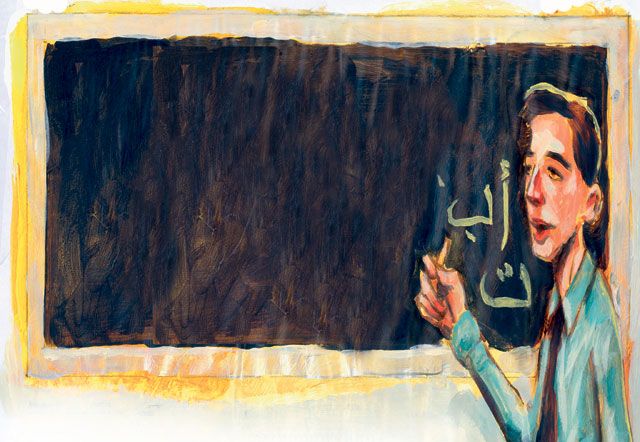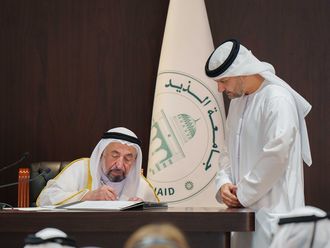Ann Francis daily learns the notes she diligently takes down in her Arabic classes, and scores A+ in exams. But the grade six pupil of an upscale British curriculum school is clueless when it comes to conversing in basic Arabic.
Francis is not an exception.
It is mandatory for foreign private schools to dedicate four hours to Arabic lessons weekly.
Even as schools, parents and the government debate the issue, private tutors are benefiting from the policy.
In Dubai, a private tutor for Arabic charges a monthly fee between Dh150 and Dh300 for two lessons per week.
Typically, the classes are held at apartments for groups of five or six children of the same grade. The teacher advertises his or her services either through newspaper classifieds or billboards. It is also spread by word of mouth.
Offering Arabic lessons outside the classroom has become a thriving business even for school teachers as parents and pupils grapple with the poorly-taught language at school.
The inspection report on schools published by the Knowledge and Human Development Authority pointed out the poor Arabic standard among pupils.
Expense
Parents who spoke to Gulf News said they are forced to spend extra on tuition for Arabic because of their children’s poor performance in exams.
"My son is doing well in all subjects except Arabic, and because of his poor scores, his overall grades are affected. I cannot help him with Arabic and he says he cannot follow what is being taught in class. So I started looking out for private lessons and found a teacher in the neighbourhood," said Nilanjana Manohar, mother of a 12-year-old Indian pupil.
Many parents like Manohar admit that they do not check the professional credentials of private tutors before enrolling their children in classes.
"I know my son's tutor is not teaching in any school. But everyone says she is good. And my son has shown improvement in the subject. So I have no reason to worry," she said.
M.S., another parent whose son is in the seventh grade in a British curriculum school said: "At school, he does not have regular homework or worksheets to complete in Arabic. And he says he cannot follow his Arabic lessons because the teacher does not explain the words and meanings in English."
According to him, his son learns the basics by rote days before the exam without understanding or appreciating the language.
David Main, a British parent, said his children are not encouraged to learn Arabic.
"When my children are growing up in this country, I think it is very important for them to learn the native language and understand the culture. But schools here are not taking the subject seriously, which is a serious problem," said Main.
Housewife-turned-tutor in high demand
Any time after three in the evening until eight, Jaya’s (name changed on request) house in Jebel Ali Gardens is bustling with students. At least two dozen children of various age groups and nationalities are flocking to her house to learn Arabic, a subject they are taught in school thrice a week.
But ask Jaya, and she says she has to start from scratch when ever a student, no matter which grade he or she is in, enrols for private lessons with her. "When I start, children are not even thorough with the alphabet even in Grade 4 or 5 and that makes me wonder what is being taught in their school," said Jaya, a housewife.
Self taught
But what makes the Indian housewife a sought-after Arabic teacher in the locality that even pupils from as far as Springs and Greens come to her for twice a week? Jaya is neither a qualified teacher nor has she ever had any formal training in Arabic. She says she mastered the language out of necessity when her children needed help with the subject when they were going to school in Dubai.
"I taught myself the basics of Arabic using the internet and progressed as my children moved to higher grades. Now I teach children up to grade 9," said Jaya, 39. She said she started offering lessons to her friends’ children when they requested and then the word spread and more parents started approaching her. "Now I have three batches of pupils — from 3.30 to 5pm, 5 to 6.30 and 6.30 to 8pm daily. I also take classes during the weekends. I am getting new requests but I cannot take any more children now," said Jaya.
She charges anything between Dh150 to Dh250 monthly per pupil. "I charge Dh150 for grades one to four, Dh200 and above for grades between four to six and Dh250 for Grades seven to nine," she said.
Jaya said her earnings are good enough to support her family and she is committed to what she is doing. "I think that is why parents are happy to send their children to me. I make sure that they understand the language, and that is one thing they are missing in their Arabic lessons at school," said Jaya.
- Dh5,100 to Dh8,750 is the average monthly earnings of an Arabic teacher who has 35 pupils.
- Children are taught in batches of five or six.
Dearth of qualified language teachers
The Knowledge and Human Development Authority (KHDA) has urged schools to pull up their socks and give due importance to the Arabic language. In the second cycle of inspections, at least three schools have been downgraded from "outstanding" to "good" ranking because of their poor Arabic classes.
But schools say they cannot implement the KHDA’s policy on Arabic because of a dearth of qualified Arabic teachers.
A private education group in Dubai said it faces problem in hiring qualified Arabic teachers. "There is a shortage of teachers available in the country and schools have to settle for what they get in terms of human resources," said the official.
Ziad Azzam, chief executive of Taaleem, the second biggest private education provider in Dubai, said schools have to make effort to attract good Arabic teachers.
"Some schools are recruiting Arabic teachers who are not the best and they fail to interest pupils in the subject. Parents who are not keen that their wards learn the language as it does not help them in their future career is also partly to blame," Azzam added.
However, experts in the study of Arabic said there are various reasons why Arabic is not taught or learned properly as a foreign language in the schools.
Namir Hanna, Founder of Rearden Education that works towards promoting the study of Arabic language, said: "You do not have enough research done in teaching Arabic as a foreign language. There are no interesting books for pupils and teachers do lack professional development. The Arabic teacher probably is the least paid, least regarded and least professionally trained and has very little resources to work," said Hanna.
Three things
"What we need is interesting textbooks, enthusiastic teachers and pupils who are willing to learn the language. If we can get those three together, I don’t see any reason why learning Arabic should be any difficult or different from learning any other language," he added.
Unfortunately, the state of teaching of Arabic is not a very exciting one.
"Technology is developing so fast that we do not have people developing content to match with the evolving technology. So we have been slowly creating a boring classroom for Arabic learners," Hanna pointed out.
According to him, the number of hours dedicated to learning Arabic is also not enough. A daily exposure of 40 minutes is recommended for the learning of any foreign language and that kind of proficiency guidelines are not followed in many schools.
Learning Arabic is a problems not only for expatriate pupils but also for native speakers because the standard or classic Arabic and the spoken dialect are completely different.
High cost
Standard monthly fees charged for Arabic tuitions, for two one hour classes per week:
- Grades 1 to 4: Dh150
- Grades 4 to 6: Dh200
- Grades 7 to 9: Dh250-300
Raising standards
The Dubai Schools Inspection Bureau (DSIB) report 2009 pointed out that schools need to raise standards in Arabic teaching.
"Last year we showed that not all private schools allocate enough time to teaching Arabic and that students' progress is limited by poor teaching, which relies too much on a very narrow range of teaching methods and is often too dependent on textbooks," said Jameela Al Muhairy, Chief of DSIB.
As per the report, most private schools give too low a priority to Arabic and Islamic studies. Approximately one in ten schools do not comply with the Ministry of Education requirements for the amount of time they give to the study of these key subjects.
In its effort to ensure that Arabic is not neglected in schools, Jameela said DSIB inspectors are closely following up on action plans schools had drawn up based on the recommendations provided by DSIB after the first round of inspections.
"Where this has been identified as an aspect requiring improvement in a school, inspectors revisiting the school will make a judgement regarding the effectiveness of the action plan and the success of the plan in addressing identified weaknesses," said Jameela.
On the issue of the poor quality of Arabic teachers, Jameela said schools are encouraged to offer opportunities for the professional development of Arabic teachers.
"Schools are autonomous and we encourage all schools to develop and train their teachers. In the DSIB Annual Report 2009, DSIB identified this as a significant challenge and responsibility for all schools," she said.













